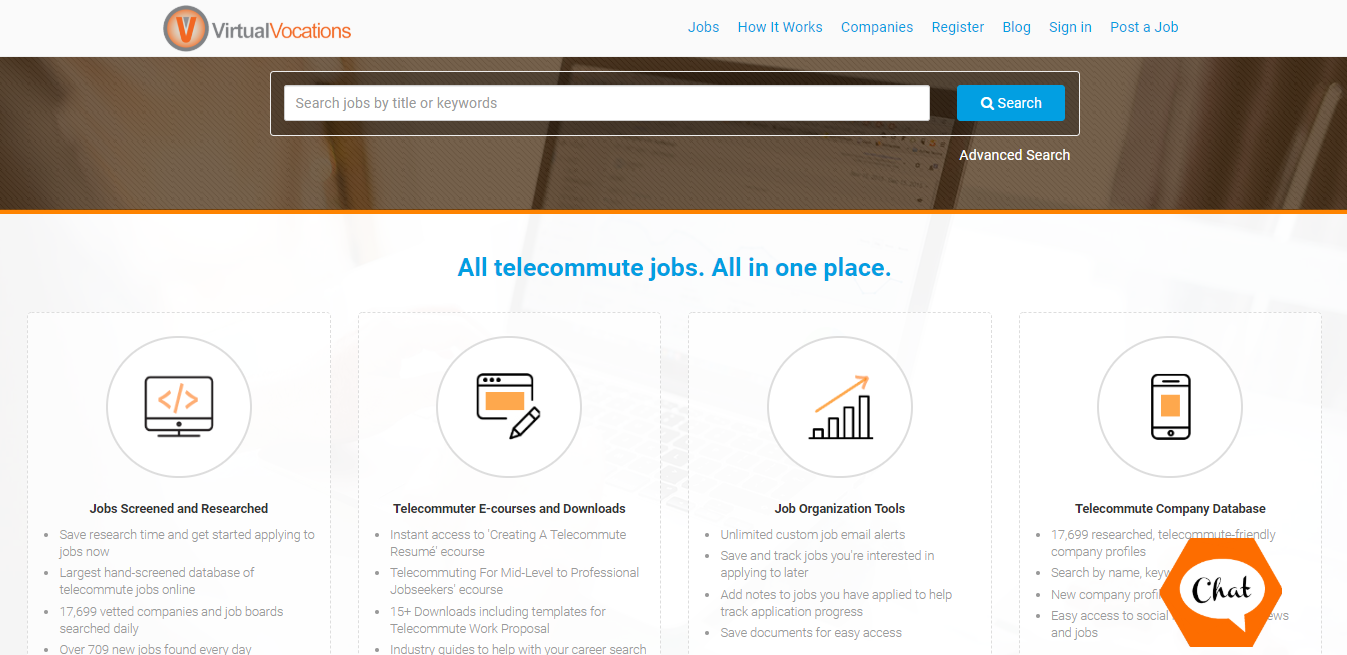Are you interested in remote work but don’t know where to begin? Use this guide as a blueprint to launch your remote career.
Launch Your Remote Career: 11-Step Telecommuting Blueprint
As of July 2018, more than four million U.S. employees work from home at least half of the time, according to GlobalWorkplaceAnalytics.com. At Virtual Vocations, we help thousands of jobseekers find remote employment through our telecommute job database and extensive library of online resources. Whether you’re looking for your first job or are an experienced professional interested in transitioning to telecommuting, follow these steps to launch your remote career.
1. Determine Why You Want to Work Remotely
First, take some time to reflect on the reasons why you want to telecommute. Your reasons will help guide your job search so that you apply to positions that align with your goals.
Many individuals pursue a telecommute career to improve their work-life balance. However, work-life balance means something different to everyone. To some workers, it means earning back time to spend with family. To others, it means having the flexibility to travel the world without sacrificing a penny.
Caregivers and parents find telecommuting helpful because they can continue their careers while caring for their loved ones. In our 2018 National Work and Family Month (NWFM) Survey Results, we found that 39% of jobseekers looking for remote work have kids or a relative that they care for at home, and nearly 43% of current telecommuters are parents or caregivers. Being able to work at home helps these professionals earn income and provide daily care for their families.
Make a list of what work-life balance means to you and how you can benefit from a flexible schedule and remote work environment. Use this list to help launch your remote career and help shape your ideal lifestyle.
Learn More: Interview Question: Why Do You Want to Work from Home?
2. Establish Your Employment Needs and Goals
Telecommuters can find work as either employees or independent contractors. Though both share many freedoms associated with remote work, there are significant differences between the two employment types. For example, employees often have access to healthcare insurance and other benefits, while independent contractors are responsible for purchasing their own. Additionally, many remote employees are subject to their employers’ regular business hours and can be told when and how to do their work. Independent contractors, on the other hand, can dictate their availability and exercise more freedom in their work processes.
Consider the advantages and challenges of each employment type to help you find jobs that align with your financial, lifestyle, and career expectations.
Learn More: Remote Work Types: W-2 Employee and Independent Contractor Pros and Cons
In either case, both employees and independent contractors can find full-time, part-time, temporary, or seasonal work. Also, some positions are 100% telecommute, while others offer a partial telecommute arrangement.
For example, telecommute healthcare practitioners may do a lot of their administrative tasks at home and travel to clinics or patient homes to administer direct care. Other positions, such as sales and consulting roles, may require you to travel occasionally for training, conferences, or client visits.
Therefore, consider your desired weekly hours and level of telecommuting in addition to benefits and other employment and contracting perks.

3. Learn About Telecommuting
Telecommuting isn’t rocket science, but many workers feel intimidated and unsure whether they’ll find a good job. As evidence that remote jobs are in abundance, scan through the Virtual Vocations telecommute job database for occupations that match your interests, skills, and career trajectory. You’ll quickly see that companies post the same types of jobs for both in-office and remote positions. Plus, telecommute jobs pay competitive salaries and wages compared to in-office jobs. So, you don’t have to sacrifice income to work remotely.
Learn More: A History of Telecommuting: Remote Work’s Evolution Explained
However, there are some pros and cons to telecommuting depending on your personality, work style, household, and technical abilities. For instance, working at home requires discipline, concentration, high-speed internet, and a reliable computer. Some positions, such as customer service representatives and interpreters, also require a quiet, distraction-free workspace.
Another factor to consider is whether you enjoy working alone or thrive by participating on in-person teams. If you’re used to a lot of interaction, telecommuting may feel isolating at first. However, as you get used to your new work environment, you’ll find ways to stay social and active while enjoying the comforts of home.
Also, remote jobs demand a little extra technical knowledge than your occupation may typically require. You’ll likely need to learn how to use a variety of cloud-based applications and adapt the way you usually communicate. Don’t let learning new technology and other challenges serve as barriers to you working remotely. Instead, use them as an opportunity for growth and advancement in your career.
Learn More: 8 Tips to Overcome Your Technology Fears So You Can Work Remotely
You may also need to check with your city or county zoning department to get permission to work at home, depending on the nature of your job.
Learn More: Do I Need Special Permits to Work from Home?
4. Sign Up for a Job Search Service
Virtual Vocations provides a telecommute job search service that saves you time and protects you from scams and false claims. Our telecommute job experts vet remote employers and screen remote jobs to ensure your safety and job posting legitimacy. When you sign up as a member, you can filter jobs according to category, geography, education level, career level, employment type, and telecommute frequency so that you find occupations that align with your lifestyle and career goals.
As you launch your remote career, you can save jobs and apply to them later, receive email alerts with the latest postings related to your search criteria, and get tips from telecommuting professionals regarding job outlooks, getting promoted, and industry trends.
Learn More: How Virtual Vocations Works: Our Services and Features Explained
5. Get Your Resume Reviewed
Let’s be honest: you may be an expert in your field but that doesn’t mean you’re a pro at convincing someone to hire you. Trained, professional resume writers know how to craft compelling career documents to catch recruiters’ attention and help you land an interview.
Therefore, your next task is to submit your resume to our Career Services Team. Our resume writers and editors can review your application documents or create new ones from scratch. Plus, we customize our resume services based on your career level because applying for an entry-level job is much different than applying for an executive position.

6. Apply to Remote Jobs
Get the momentum going as early as possible by applying to remote jobs right away. TalentWorks recommends sending your resume within 96 hours of the posting and between 6:00 a.m. and 10:00 a.m. So, don’t wait for the evenings or weekends when recruiters and employers are off the clock. Instead, submit your application bright and early to significantly increase your chances of getting a response.
Learn More: Employers Aren’t Responding to Your Job Applications? 12 Reasons Why
We know that applying for jobs takes a lot of work, especially if you’re already employed full-time. Therefore, treat your job search like a project and schedule times to search, apply, and follow-up so you don’t get overwhelmed and lose momentum. Leverage the email job alerts and visit the telecommute job database daily so that you can apply as soon as possible.
Learn More: 7 Methods for Treating the Job Search Process Like a Project
7. Decide Where to Work
While applying for jobs, decide where you want to work. Depending on the nature of your position, you might get away with slouching on the sofa in your sweats. However, if you have an extra bedroom or closet, you may find a home office or desk is best. You may even consider a hybrid work model, where you work at home for a few days, then head over to a coffee shop or library to change up the scenery and socialize.
Additionally, co-working spaces provide business amenities and are great for networking. Most co-working centers offer day passes and memberships for shared workspaces, dedicated desks, and offices. Though purchasing a co-working or other type of professional space adds to your overall costs and commute, you may be able to deduct rent on your income tax returns. Also, employers sometimes subsidize the monthly fee or give you a workspace stipend. So, keep co-working in the back of your mind as an option if working from home or the coffee shop proves challenging.
Learn More: Co-working Cost Analysis: Is Renting Workspace Really Worth It?
8. Get the Right Equipment
At the bare minimum, you need high-speed internet and a computer to launch your remote career. Depending on your job, you may need other items and services, such as a headset with a microphone, security software, and international text messaging. Use the telecommute job database to research the type of equipment and services telecommuters in your occupation typically need. If you choose full-time or part-time employment, employers often provide all the equipment and software you need to perform your job. However, if you do purchase anything, keep your receipts as you may be able to deduct home office expenses from your annual tax returns.
Learn More: 25 Home Office Accessories to Make Your Workspace Fierce

9. Arrange for Help
If you need childcare or other services, research and arrange for them before you start a new role. Use the time as a break-in period to get everyone acclimated to the new routine. Plus, you can use the relief to apply for more jobs and increase your chances of landing an interview.
Learn More: 8 Work-Life Balance Tips for Caregivers Who Work Remotely
10. Follow Up and Keep Applying
Following your remote job interview, ask the employer about the next steps and the time frame for when they expect to fill the position. Also, send a thank you letter to the hiring manager to reiterate your interest in the role and express your gratitude for the opportunity to interview. If the employer was unable to provide you with a timeline for expectations, the standard accepted practice is to wait approximately two weeks before sending a follow-up email about your interview. If you still don’t get a response, then it’s time to move on and continue applying to other companies.
Learn More: Job Interview Follow-Up: The Dos and Don’ts for Remote Jobseekers
11. Practice Interviewing
Telecommute interviews are usually conducted over the phone, but some may include a video conference. Practice each method with a friend or family member to test the audio quality and video on your devices.
As far as the questions go, telecommute job interviews are the same as in-person interviews. Therefore, reflect on commonly used prompts and write down a few scripts. When you receive an interview invitation, go the extra mile and thoroughly research the company to prove your interest and show how your career goals and skills align with what the company seeks.
In addition to typical interview questions, be prepared to submit samples of your work, complete assessment tests, and demonstrate your skills in an audition format. According to LinkedIn’s Global Recruiting Trends 2018 study, more companies are instituting try-outs, just like in sports, to see their candidates in action and ensure a culture fit.
Learn More: 12 Questions to Ask Employers During Virtual Interviews
The Next Step in Your Telecommute Journey
Take your career and Virtual Vocations membership to the next level by checking out all the resources in the Telecommute Toolkit, including handbooks, industry guides, e-courses, and resume templates.
Please contact us with any questions you have! Our team is more than willing to help you navigate the job database and sign up for career services that will make your job search as smooth as possible.
Are you ready to launch your remote career? Connect with Virtual Vocations on Facebook, Twitter, and LinkedIn to tell us about the telecommute job you want. We’d love to hear from you!
iStock Photo Credit: 1. pijama61; 2. marekuliasz; 3. kate_sept2004

Learn how our service works, browse job leads by location and career category, or search hundreds of hand-screened telecommuting jobs to find legitimate work-at-home job leads that match your skills and background.
Register for free or contact us for more information on our service guarantee. We look forward to hearing from you!




